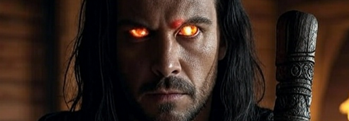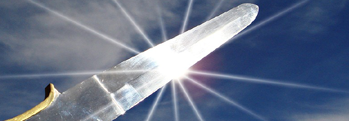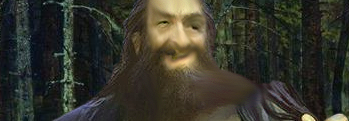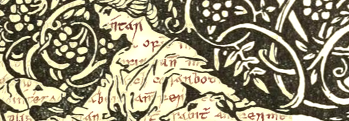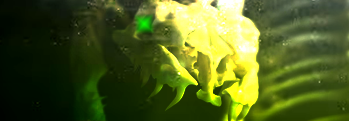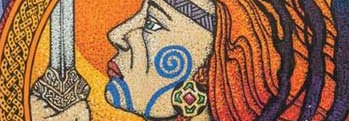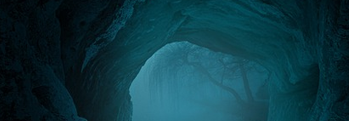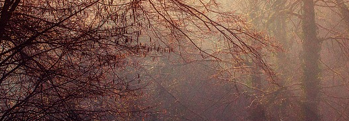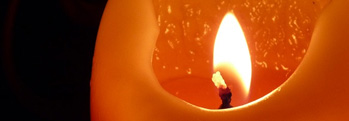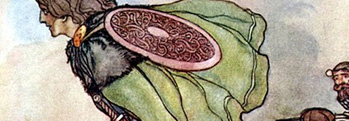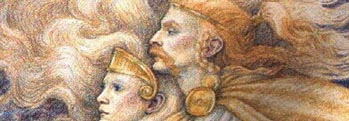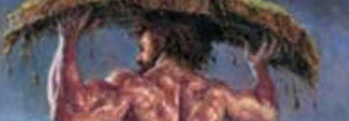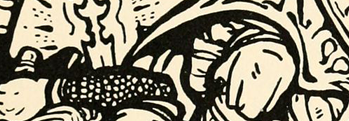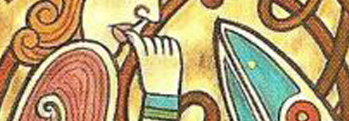The Footrace of the Fianna
Irish and Celtic myths and legends, Irish folklore and Irish fairy tales from the Fenian Cycle
A Fenian tale of a madman with a grey cloak
 It was in the days of Fionn and the Fianna, a very long time ago in Ireland, that the people of Ben Edair decided to hold a festival, a Feis or Aonach, to celebrate the season. All of Fionn’s hosts were gathered, the seven ordinary warbands and the seven extraordinary warbands, and they danced and played music merrily with the people.
It was in the days of Fionn and the Fianna, a very long time ago in Ireland, that the people of Ben Edair decided to hold a festival, a Feis or Aonach, to celebrate the season. All of Fionn’s hosts were gathered, the seven ordinary warbands and the seven extraordinary warbands, and they danced and played music merrily with the people.
Then suddenly one of them let out a cry – he had spotted a sail afar over the broad blue expanse of the sea, and soon they could all see a large, smooth-sided and proud-looking ship ploughing the waves from the east, approaching them under full sail.
So large was this ship that when it ground up on the white sand they expected an army to march out, but instead only one man came forth. He was a hero of great size and strong form, wearing on his head an impenetrable helmet of polished steel, carrying a deep-furrowed, thick-backed, sharp-edged sword, and a purple-bossed shield over his shoulder.
Fionn, the master of the Fianna, addressed the heroic champion, and questioned him, saying,
“What part of this green earth have you come from, fair and noble youth? From which people, fair or foul, have you sprung? And what is your name?”
The stranger looked around, pausing long before responding.
“I am Ironbones, the son of the King of Thessaly, and I have conquered every land by my sword and my arm. And this is my plan for today, to take the crown and tribute of your country. If you refuse my challenge, I will bring slaughter of men and a great loss of heroes and youthful warriors to the Fenian host. That is who I am and that is what I want.”
Conan the bald snorted and spat out a mouthful of mead.
“In truth, laddie, should you live to be a century and another after that, you won’t achieve your goal – from the beginning of ages until now, no hero has ever left Ireland without having met his match.”
Ironbones smirked and replied, “I don’t care what you have to say, my bald friend, for if all the Fianna heroes who have died within the last seven years were now in the world and were joined by those who are now living, I would grant to all of them the sorrow of death and teach all of them to appreciate the sweetness and shortness of life in one day.”
“But let me not be called a blood thirster or ravager – I have a peaceful alternative in mind. I challenge you then, oh warriors, to find me a man among you who can best me in running, in fighting, or in wrestling. If you can do this, I shall give you no further trouble and return home to my own country.”
They decided to try the footrace first, but Fionn realised their Man of Swiftness, Caoilte Mac Ronan, was not at the festival, so he went away to find him towards Tara of the Kings.
As well as he knew the roads, there were fewer roads then than there are now, and Fionn managed to get lost on the way! He came to a dense, wide, and gloomy wood, divided in the midst by a broad and boggy pathway.
He had not gone but a few steps into the forest when he saw a strange figure coming the other direction! It was an ugly and shabby looking giant, who wore a long ragged grey cloak which reached all the way down to his feet, but whose hems were so spattered with yellow mud that they made a loud clapping sound wherever he went.
Each of his two legs was like the knotted trunk of a large tree, and the two shoes he wore were like shapeless leather canoes barely containing hairy, long-nailed hoofs, and they kicked up a mighty splatter of muddy water when they landed.
Fionn was amazed, having never seen so large and misshapen a person, but he was about to pass on his way only the giant stopped him.
“Well if it isn’t Fionn Mac Cumhaill!” said he, “where are you off to in such a hurry?”
Fionn tried to brush him off and keep moving but the giant was having none of it.
“You may keep your silence and your secrets,” said the giant, “but you will keep all the loss and misfortune that comes with them too!”
Fionn eyed the wild-eyed mighty brute and thought it would do little harm to tell him all, if it would clear the way, and so he did.
Upon hearing the tale, the giant squatted down, scratching his chin, which was still higher than Fionn’s head. He had heard of this Ironbones, he said, and knew well he was capable of making good on his threats! The giant did not believe Caoilte Mac Ronan was swift enough to match the prince, and said that too.
When he saw Fionn looking despondent the giant only laughed and clapped him on the shoulder.
“You need do nothing oh Fionn, except let me be your champion against this champion, and maybe I might be able to get you out of this mess!”
Fionn looked sceptical – “But it seems to me a full day’s work for you would be carrying your big cloak and dragging your canoe-shoes a half a mile, never mind trying to outrun this Ironbones.”
“Believe what you like,” replied the giant, “but if I can’t get you out of this fix, I promise you no man in Ireland can. Be of good cheer, for I will help you!”
“And what is your name?” asked Fionn.
“They call me Bodach an Chóta Lachtna,” said the giant with a grisly grin, which means the lunatic with the grey cloak.
Shaking his head, Fionn agreed to the giant’s offer, and they returned to the rest of the Fianna, who were amazed and indeed impressed to see this strange figure accompanying their leader. When Ironbones caught sight of him, he blanched and shrank back at the thought of vying with such a monstrous figure. He may have felt something uncanny at work, for he was more than a little uncanny himself.
“What! do you expect me to demean myself by contesting with such an ugly, greasy, hateful-looking creature as that? I tell you that will do no such thing!” said he, and stepped back, and would not go near the Bodach.
The giant burst out into a harsh and thunderous laugh, mocking Ironbones and asking him what did he have to lose, but a footrace? Goaded, the prince agreed, seeing he had been backed into a corner by his own generous offer.
But no less than three score miles did he insist they ran, a champion’s course indeed!
The Bodach scratched his head and nodded, saying it was about sixty miles from Mount Lúcra in Munster to Ben Edair, so that should be the track they took.
The two set off, at the giant’s suggestion, to survey the path they would be racing on the next day. As soon as they arrived, the Bodach suggested they should build huts to sleep in, or they would be likely to have a hard couch and cold quarters on the exposed hill.
Ironbones simply sneered and responded, “do as you please, if you please, O Bodach of the Big Cloak, but I am Ironbones and care not for comfortable living. I am mightily disinclined to give myself the trouble of building a house only to sleep in it one night and never see it again. But if that’s the use to which you would put your hands, have at it!”
“Very good,” said the Bodach, “but be sure that a certain person who refuses to assist me shall have no share in my sleeping-room!” and with this he began cutting and shaping pieces of timber from the nearby wood until he had built himself a fine house with a fire crackling merrily at the front door.
Warming his hands, the Bodach called out again into the night, asking if the prince had food with him, or drink of any sort, to which the prince answered he had not, for he had no servants to carry them.
“Maybe the best thing for you so would be to come hunt with me in the woods,” said the Bodach, “and we’ll soon have plenty of fresh food for the both of us!”
“Never have I hunted afoot,” sneered Ironbones, “and I’m not about to start with the likes of you!”
“Suit yourself” shrugged the giant, and bounded away into the woods with great energy. He wasn’t long finding a herd of wild hogs, and catching the biggest and fattest, he soon had it cooking in two halves on a self-moving holly-spit over his fire.
Next he leaped out and travelled thirty miles as quick as you like to the Dún of Inchiquin, which was thirty miles distant, bringing back a table and a chair, two barrels of wine, and all the bread fit for eating he could lay his hands on. By the time he returned he found the half-hog well cooked and ready for chewing, so he sat himself down to eat one half, half the bread, and drink one barrel of wine, leaving the rest for breakfast.
Having finished his supper, he shook a large bundle of green rushes over the floor and laying himself down, soon fell into a comfortable sleep, which lasted until the rising of the sun next morning.
Come the morning, a red-eyed Ironbones gazed balefully at his snoring opponent, having gotten neither food nor sleep the whole night, then let a shout to wake him up, demanding they begin their race.
The Bodach raised his head, rubbed his eyes, and replied, “I have another hour to sleep yet, and when I get up I have to eat half a hog and drink a barrel of wine. But as you seem to be in a hurry, you have my consent to proceed on your way before me: and you may be sure I will follow you.”
And with that he pillowed his head on his hands and fell to snoring again. Ironbones could hardly believe this impetuous oaf, but he started the race anyway, although with a heavy and suspicious feeling in his heart.
True to his word, the Bodach slept another hour, then woke up and ate and drank his fill, before he put the hog’s bones in his pocket and commenced the race at a brisk trot, like a pure and cool breeze of wind.
As swift as Ironbones was, it didn’t take long for the giant to overtake him, and with a gesture of great charity he threw down the bones of the hog behind him, insisting the prince was quite welcome to any pickings he might find upon them, and even that he was willing to wait until Ironbones had finished.
The fury of the handsome prince rose in his throat when he heard this, and bellowed “You ugly Bodach with the Big Cloak, you greasy, flabby, uncouth tub of a man, I would see you hanged, so I would, before you should catch me picking such dirty common bones as these—hogs’ bones, that have no meat on them at all, and have moreover been gnawed by your own long, ugly, boarish tusks!”
The Bodach shrugged and answered that if the prince didn’t want his breakfast, he’d better pick up the pace if he was to have any profit, never mind the crown, sovereignty, and tributes of the kingdom of Ireland from this day!
With that, the giant ran off faster than a hare, faster than a swallow on the wing, faster even than a mountain wind being chased by the snow! Ironbones was about as able to keep up as he was to climb the clouds, until about halfway through the course, when the prince caught up with the giant, who had stopped to eat some delicious wild blackberries.
Knowing he had little chance of besting this creature by the speed of his legs, the princce thought he’d try the speed of his wits instead.
“Bodach,” said he, “ten miles behind us I saw one hem of your grey cloak, and ten miles farther back again I saw another hem, and it is my opinion, that you should return for these two hems and pick them up.”
“Is it the hems of this big cloak that I have on me you mean?” asked the Bodach, looking down at his legs.
“Why, to be sure it is them that I mean,” answered Ironbones.
The Bodach agreed that he should return for the pieces of his cloak, as long as the prince agreed to wait and eat blackberries until he caught up again.
“I will do neither,” scoffed the prince, with a steely glint in his eye, at which the giant let him run on ahead.
Off he raced, while the Bodach retraced his steps until he found the missing pieces of his cloak, which he tacked to the upper parts and raced off to overtake Ironbones yet again.
“You’d want to pick up the pace o prince!” he shouted as he whizzed past, “otherwise I think you will have made a wasted journey!”
The giant didn’t stop until he reached the side of a hill, within ten miles of Ben Edair, where he again started plucking blackberries and eating an extraordinary number of them.
When he could eat no more, his jaws being tired and his stomach stuffed, he took off his great cloak, and taking out his needle and thread, he sewed it into the form of a capacious sack, which he filled with blackberries; this he slung over his shoulders, and then off he scampered for Ben Edair, greatly refreshed, and with the speed of a young buck.
Ahead of them, Fionn and his warriors were waiting in dread and doubt, pacing back and forth, wondering if they had made a terrible mistake in letting the giant run, although feeling somehow they should trust the Bodach. One of his men, strong of arm but weak of eye, had been sent to the top of the Hill of Howth to watch and see which of the competitors would come first.
When this man saw the Bodach coming over the nearest hill with his heavy burden on his back, he thought for sure it was Ironbones and fled back in terror to Fionn and the Fianna, telling them Ironbones was on his way, carrying the Bodach dead over his shoulders.
With a great clamour and shout Fionn and the Fianna ran about in despair, until Fionn shouted, “a silver shield and a golden sword to the man who brings me better news than that!”
One of the heroes ran further up the hill and returned with glad tidings that he had seen the Bodach coming, but no sign of prince Ironbones.
Fionn all but skipped out to meet his benefactor, who wheezed and came to a halt before the host, but before he could utter a word of grateful thanks, the giant held up a hand and panted
“My hunger is great, and my desire for food pressing, and I cannot tell you what has happened until I have eaten a very large quantity of oatmeal and blackberries. Now, I have got the blackberries myself in this big sack, but the oatmeal I expect to be provided for me by you, and I hope that you will lose no time in getting it, and laying it before me, for I am weak for the want of nutriment, and my corporeal powers are exhausted.”
Fionn and his men quickly moved to fetch a vast quantity of oatmeal which was spread on the Bodach’s cloak, where it was mixed by the giant with a long stirring-pole, before he began eating and swallowing with much vigour and determination.
Not long had he been getting stuck in when who did he see but Ironbones himself marching towards the company with eyes like red flaming coals and one hand on the hilt of his sword. He looked like he was ready to start slaughtering, and he was, but the giant knew well his intentions.
Lifting a solid clump of oatmeal and berries, the Bodach hurled it at the prince’s head, smacking him so hard on the face that it took his head clean off, sending it spinning a half mile away from his body, which kept twitching and spasming in death throes long after it should have ceased.
For as I said, there was something not entirely canny about Prince Ironbones.
Untroubled, the Bodach finished his meal and got up to look for the head, which he duly retrieved and hurled bouncing along the ground until it reached the body, where it reattached itself firmly, only it was on backwards. The face was now turned completely round to the back of the neck, while the back of the head was in front.
Having done this deed, the Bodach wrestled Ironbones to the ground and tied him hand and foot. When the prince was securely bound, the giant turned an amber eye upon him.
“O Ironbones, justice has finally caught up with you, and what you have done to so many others is about to be done to yourself instead. The only words I will allow you to speak are those which decide the manner of your death!”
“What foolishness to think you, single handed, could make yourself master of the crown, sovereignty, and tributes of Ireland? Your arrogance ha returned to you now!”
“But take comfort for never let it be said the Fianna slaughtered a lone enemy and him tied at that. So, if you still wish to live, on condition that you will solemnly swear by the sun and moon that you will send the chief tributes of Thessaly every year to Fionn Mac Cumhaill here in Ireland.”
Eventually and pulling many a sour expression Ironbones agreed to these terms, so the Bodach set him loose, pushed him onto his ship, and kicked his ship so hard it went seven miles in one hop.
So was Ironbones given his farewell from Ireland, and the Bodach was feasted sumptuously and with great honour by Fionn and the Fianna for a year and day after that.
And these are the adventures of the Bodach an Chóta Lachtna!
Ben Edair is marked on the map below!
More Legends from the Fenian Cycle
Mongán mac Fíachnai was a prince of the Gaels, none other than he whose father was Fíachnae mac Báetáin, and it was about the seventh century in Ireland when he ruled over Ulster. Many are the tales told of him and his royal reign, with some even whispering that he was the son of Manannán mac Lir, ancient G ... [more]
The Corleck stone head is believed to be an ancient pagan idol, representing perhaps some ancestor or deity from the pre-Christian era in Ireland. The most striking aspect of the Corleck stone head is its three faces, set in strange, almost unsettling expressions, all the more remarkable for their simplicity of design, lacking ears or detailed feat ... [more]
The Clonoura shield was discovered standing upright in a bog in Clonoura, county Tipperary and represents one of the very few fully intact Iron Age shields that have ever been found. It is marked with many slash and stab scars from knives, swords, spears and other sharp weapons, and dates from 30 to 60 AD, pre-Christian Iron Age Ireland. It is q ... [more]
The days of the heroes of the Fianna have captured the imaginations of many throughout the ages, and one such was the ninth century poet Gofraidh Fionn O’Dalaigh, one of the finest poets in all of Killarney and all of Ireland. For it was his pen and none other that first put quill and ink to parchment and recorded the old story of Reicne F ... [more]
It was a fine day in Ireland many years ago when Fionn and his Fianna took a fancy to go out hunting. Warm was the sun amid the whispering glades of ancient forests, gentle was the breeze and sweet the scent of summer flowers in its bosom. Sweeter yet was the sight of a mighty deer to the eyes of the hunters, and so they gave chase, howling with de ... [more]
It was in the days of Fionn and the Fianna, a very long time ago in Ireland, that the people of Ben Edair decided to hold a festival, a Feis or Aonach, to celebrate the season. All of Fionn’s hosts were gathered, the seven ordinary warbands and the seven extraordinary warbands, and they danced and played music merrily with the people. Then ... [more]
There are few these days who have not heard of Fionn Mac Cumhaill, hero and defender of Ireland, or at least might recognise his name. But there were no creatures that Fionn loved amongst his three hundred dogs more than his two favourites, Bran and Sceolan, meaning Raven and Survivor, and though it’s a stranger story than most, this is the t ... [more]
It is not unusual for stories in the Irish legendarium to have more than one meaning besides that of a literal recounting of historical events, whether by accident or by design. Some tales were meant to be understood in the context of the era and culture of the story teller, while others might instruct in certain arts, and yet others contain myster ... [more]
Those monks who recorded the mythologies and folklore of Ireland which had previously been passed down by word of mouth from bard to druid to bard for countless generations were, by their very nature, devout Christians. As Christians they were dedicated to not only God and His Church, but to the people who bore and nurtured them, and everywhere the ... [more]
One day Fionn Mac Cumhaill, doughty hero of Ireland, and his friends Goll, Cialta and Oscar, as well as others of the Fianna, were resting after the hunt on a certain long hill now known by a different name. Their meal was being made ready, when what should happen only a girl of the kin of the giants came striding up and sat down among them, a grea ... [more]
Something which often appears in the most ancient tales of Ireland is the grisly vision of heads which speak after being separated from their bodies! This was said to be an art of the druids inherited from the necromancy of the Dé Danann, who were themselves said to be able to raise a whole army from the grave to fight again day after day! ... [more]
There once was a young fellow called Conall, and he lived with his parents in the east of the country. They lived a quiet life, catching fish and digging up oysters for meat and lamps, but one dark day the Fomors came and demanded tribute. Having none to give, his father bid the sea demons begone, but instead they made to take himself and his famil ... [more]
Young Fionn Mac Cumhaill was out walking with his dog Bran one fine morning, and he happened to pass into a deep and thick dark wood of the kind that once covered all of Ireland, for the hunting was better there, when what did he come across but a thousand horses hauling timber and men chopping down the trees and preparing the logs. "What a ... [more]
There was a mighty warrior in the west of Eriu, and Cumhal Mac Art was his name. Feared was his axe and he could skewer two men with a single cast of his feathered war-dart, and yet for all that he lived a lonely life, and a life of fear – for it had been foretold that should he ever marry, he would die in battle the very next day! But all ... [more]
It was in the day of Fionn Mac Cumhaill when he was an old man, yet still hale and hearty, that one of his warriors, whose name was Diarmaid son of Donn and grandson of Duibne, had carried off his young bride-to-be, Gráinne daughter of Cormac! The two had fallen in love and Gráinne, for all of Fionn's fame, wanted nothing to do wi ... [more]
One warm summer's day Fionn and his men were out hunting through the darkling forests of Ballachgowan in Munster, chasing deer and boar through the gloomy glades, when they stopped short all of a sudden and came face to face with a startling sight! For what had stepped between them and their prey but a strange, damp giant of a man. Black wer ... [more]
Fionn Mac Cumhaill stood at the door of his hunting lodge with his fists on his hips, his heart sinking as he realised his intentions to hunt for deer this day were lost in the waves of mist and fog that had rolled in from Dublin bay, although at that time it was known by a different name. It had come as far inland as Gleann na Smol, the Glen of th ... [more]
When Fionn Mac Cumhaill became leader of the Fianna, the fiercest and most warlike of those bands of heroes who lived in the wild places, hunting and acting as champions for their kings, and defending Ireland from evil, he decided that he wished to have only the best warriors to follow him. So he sat down and sucked his thumb to taste the wisdom ... [more]
Close by where Limerick city stands today lie the ruins of an ancient and once mighty fortress called Carrigogunnel, which commanded all the lands about with a stern hand. It was known then as a place of ill omen, and it is known today as the same, for it was once the home of an uncanny hag by the name of Gráinne. Amid the surrounding mar ... [more]
A dark horde of fell-handed warriors approached Ireland, sails gathered off the coast like storm clouds, billowing out in the gusts of uncertain wind, while oars bent to the rolling thunder of drums. Fierce indeed was the host of King Colgan, master of Lochlainn, and he came to make war on Cormac Mac Airt, High King of Ireland! As soon as Fionn ... [more]
Diarmuid the Fair, son of Donn or Duibhne of the Tuatha De Danann was one of the Fianna, the great warriors of ancient Ireland who protected the land from dangers near and far. It was said that no woman could resist his gaze, for he'd been granted the blessing of comeliness by the Ghost Queen Morrigan after he helped her out of a spot of bother ... [more]
Fionn Mac Cumhaill and the rest of the Fianna were resting after a great battle, weary and sore with sorrow at the loss of their fellows, when they spied coming along the shores of Loch Lein in County Kerry a beautiful young woman riding a swift horse, so swift indeed that its hooves scarcely seemed to touch the ground! Now although the women of ... [more]
Now it is known by some that the fairies of Ireland weren't much like the fairies we hear about in these latter days, harmless things of mischief and frolic, but were instead respected and often feared, for their anger was quick and their kindness was whimsical. Some would join men in battle, and some would make war on men, others were omens of ... [more]
It was a fine brisk spring morning in Ireland when Fionn Mac Cumhaill decided to take himself for a stroll along the white sandy beaches of the seashore, the better to breathe the air and enjoy the simple pleasures life had to offer. But that morning, life had more to offer and it didn't look pleasant, for it was a giant bearing down on the bea ... [more]
Fionn MacCumhaill was well known as a fair and handsome man, but his most distinguishing feature was his grey hair - and he was not born with it! Fionn was one time out on the green of Almhuin, and he saw what had the appearance of a grey fawn running across the plain. He called and whistled to his hounds then, but neither hound nor man heard hi ... [more]
After his seven years of training with the poet Finegas were done, Fionn Mac Cumhaill took himself from the river Boyne to the great hall of the High King in Tara, Conn of the Hundred Battles, to present himself there as a member of the Fianna, the very best of the best warriors throughout Ireland. Announcing himself, Conn took him into the band an ... [more]
Here is the story of how Fionn MacCumhaill gained the knowledge of the world. And wouldn't it be a great thing to know it all? Still, knowledge and wisdom must be balanced, and this was known to the young man called Fionn, which means fair and bright. He was fleeing from the warriors who had murdered his father when he came upon the hiding plac ... [more]




